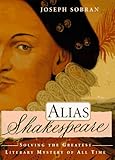Guest Review by Andrew Buckley
Alias Shakespeare: Solving the Greatest Literary Mystery of All Time (1997) by Joseph Sobran
Rating: 





Joseph Sobran was originally an orthodox (Stratfordian) scholar who became increasingly puzzled by the complete failure of ‘William Shakespeare’ to leave even the faintest trace of his life or personality on the works of poetry and drama bearing his name. Sobran cites numerous ‘biographies’ of extraordinary length( one over 600 pages), all of which has been constructed on factual information sufficient to fill four sides of A4 paper. This is literally all that is definitely known of the man Sobran identifies for clarity as ‘Mr Shakspere’, one of 39 possible spellings. These biographies tend to be filled with suppositions relating to what the person who wrote the Plays must have done, all attempts to make Shakespeare as interesting as even the least of his works fail miserably..
When I first spotted “Alias Shakespeare” by Joseph Sobran I was very ready to give attention to a book purporting to ’solve the greatest literary mystery of all time’. Sobran was for years a Shakespearian scholar whose doubts grew in proportion to his research.
While Sobran examines many alternative possibilities as to authorship, he rapidly reaches the conclusion that Edward de Vere, seventeenth Earl of Oxford is the one whose fingerprints appear on virtually everything ‘Shakespeare’ ever wrote.
Does this question of who wrote the plays and sonnets really matter? We have the plays…personally I find the plays a great deal more interesting having followed the fascinating links to the plays to be found in the life of Oxford as researched by Sobran, first proposed by J T Looney (pronounced Lone-e) in “Shakespeare” Identified published in 1920. How did “Mr Shakspere” know so much about the Danish royal court at Elsinore (Hamlet)? Did he know somebody there? Oxford’s brother-in-law was ambassador. How did ‘Mr Shakspere’ know Lord Burghley well enough to parody him as Polonius (Hamlet)? Oxford knew him better than most, he was Burghley’s son-in-law. Why are nine (possibly ten) plays set in Italy, revealing an intimate knowledge of that country, when no one even suggests that ‘Mr Shakspere’ ever went there? Perhaps because the real author loved Italy and visited many times. Was ‘Mr Shakspere’s’ imagination informed by his own experience when he describes Hamlet, kidnapped by pirates in the English Channel and released unharmed for no better reason than that the pirates liked him? Even were Oxford the author this would seem like pure fiction…yet this really did happen to Oxford. There are many more such links to the plays and that is before we start on the sonnets.
The Sonnets have so long defied any serious attempt to tie them to the life of “Mr Shakspere” that many critics have been forced to regard them as pure, or almost pure fiction. Yet what strange and uncomfortable fiction for so great a writer to produce.
In fairness to those who claim that the Sonnets cannot possibly contain consistent source material in the life of a real person, they certainly don’t find any resonance in the life of ‘Mr Shakspere’ of Stratford. What of the Earl of Oxford? Once again the parallels are quite extraordinary. His relationship with the Earl of Southampton fits very precisely the tone and content of those sonnets addressed to him (even orthodox Stratfordians mostly acknowledge Southampton as “Mr W.H.”) The idea of a poor poet urging his noble patron to , “Make thee another self, for love of me” is absurd. These sonnets were, as Sobran demonstrates ably and repeatedly, addressed to one of equal rank.
Sonnet 125 describes the poet as having “borne the canopy” – it is a matter of historical record that Oxford would have carried the royal canopy of both Elizabeth and James I.
“Alias Shakespeare” is a book which deserves to be read whatever opinion one may hold regarding the authorship question.It is highly entertaining yet meticulously researched, iconoclastic but always reasonable. ‘Is it not just another conspiracy theory? You may ask. Maybe, but in this case a 400 year old conspiracy to ‘conceal and protect’ the true author of Shakespeare’s works, or, a conspiracy of academic inflexibility in the face of growing evidence?
This material is just a small taste of what is now available to research for yourself on the internet. The links below are an excellent start, after reading Joseph Sobran, of course.
My thanks to Mr Andrew Buckley
A summary of the debate on Charles Beauclerk’s site: http://www.whowroteshakespeare.com/
Highly recommended site: http://www.shakespearefellowship.org/virtualclassroom/
Pay particular attention to Roger Stritmatter’s dissertation on de Vere’s annotated Geneva Bible. Very persuasive evidence for Oxfordian position.
For Stratfordian position, see http://shakespeareauthorship.com/